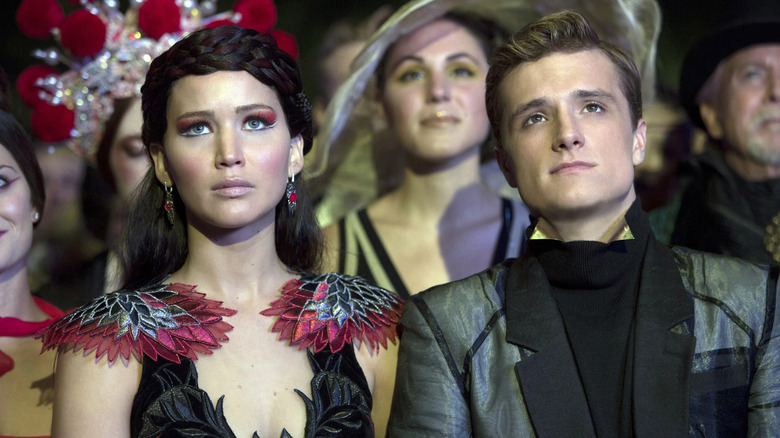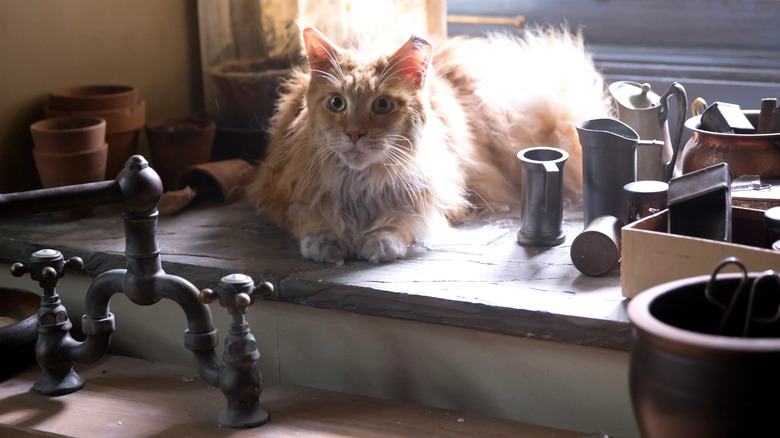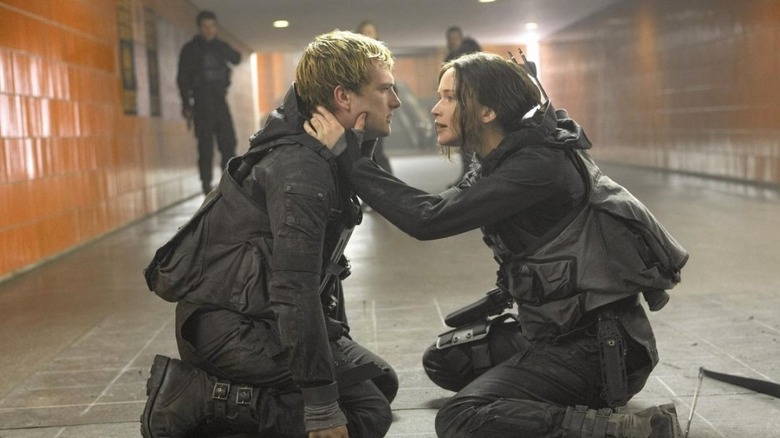The Hunger Games: Why Director Francis Lawrence Turned Down A Steamy Fan Request
Any "Hunger Games" fans who were hoping for a more adult vision of the books might have been disappointed, but according to director Francis Lawrence, keeping any overt sex out of the movie was the right call.
Bending to too much fan pressure can be dangerous for any director, and Lawrence, who directed the final three "Hunger Games" movies after taking the reins from Gary Ross (who directed "The Hunger Games"), knew what fans wanted from "Catching Fire" and both parts of "Mockingjay." That said, he told the Los Angeles Times in 2015 — after the movies concluded — that, with all due respect to fans of Suzanne Collins' novels, he wouldn't film any sex scenes between Hunger Games competitors and star-crossed lovers Katniss Everdeen (Jennifer Lawrence) and Peeta Mellark (Josh Hutchinson). It's worth noting that there are no overtly sexual scenes between the pair in the books, other than the fact that they share a bed to help soothe each others' night terrors.
"There are definitely ideas that they come up with that we don't want to do," Lawrence said at the time. "The 'everlark' sex. Where they want Katniss and Peeta to have sex at the end of the movie, have a sex scene. There was no shooting that. These just aren't sexual movies."
Francis Lawrence clearly had a keen understanding of the Hunger Games novels
Lawrence clarified that, frankly, that's just not the point in this dystopian story, where children from twelve districts in a tightly controlled country called Panem (that was once, presumably, the United States) are chosen to compete in the Hunger Games, where twenty-four children enter and one leaves. "The romance itself too, nobody actually has time to truly think about romance," Lawrence correctly pointed out. "It's all sort of situational. It's about comfort and trauma. She's not pining over boys. It's not like 'Twilight.' That was all about abstinence and wanting somebody so badly. I get it in stories like that; in this, it just didn't make sense."
Still, Lawrence was clear elsewhere in the interview that he did want fans to be happy insofar as he wanted to make sure he really stuck to the books themselves. "One of the big pitches I made was that I didn't want to reinvent, I wanted to make the book," he told the LA Times. This even came down to seemingly tiny details like recasting the Everdeen family cat, Buttercup, a black-and-white cat in "The Hunger Games" and an orange cat in the subsequent films, as he's described in the books. "Everybody was with me on that; obviously so was Suzanne Collins," he said. "Luckily, Suzanne isn't a total stickler about everything; she's a great collaborator. Fans get attached to things, and they get attached to things like that cat."
Luckily, producers agreed that recasting the cat made sense despite some hesitation, and Lawrence got his way: "They were worried that I might have issues with suddenly there's inconsistencies with the cat from one and two. But I didn't care. I would rather fans be happy."
What happens with Katniss and Peeta in the end?
Well, it's pretty complicated. After they're both forced back into the Hunger Games arena in "Catching Fire," Katniss and Peeta end up separated; Katniss works with the newly rediscovered District 13 in their uprising against the corrupt Capitol, while the Capitol holds Peeta hostage. When they get him back, he's been brainwashed to attack Katniss, but ends up managing to shake that by remembering that he does love her. Katniss still isn't sure she feels the same way — not only is Katniss, as Lawrence pointed out, relatively uninterested in romance, but she also has a connection with her childhood best friend from District 12, Gale (Liam Hemsworth).
This problem gets gruesomely "solved" when Gale is involved in a bombing that kills Katniss' sister Prim (Willow Shields), at which point Katniss "chooses" Peeta. The epilogue in the film takes a much sunnier approach to their ending together, but in the book, Katniss, speaking in first person, specifically says that she never wanted children for fear of them ever having to compete in the Games, but that she did it to make Peeta happy... and that she still suffers from severe, crippling post-traumatic stress disorder. It's certainly not the happiest of endings, but this is a series that involves quite a lot of child murder, so if you came into it expecting true happiness, you may have been barking up the wrong tree.


